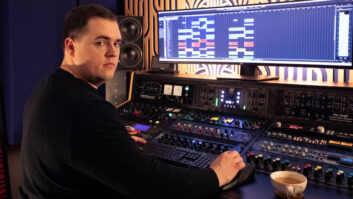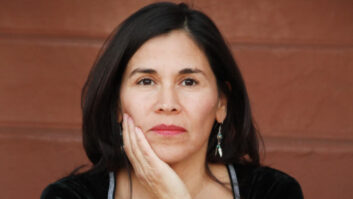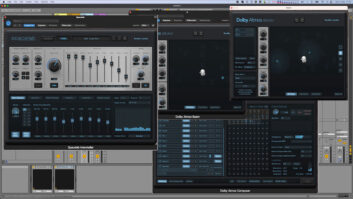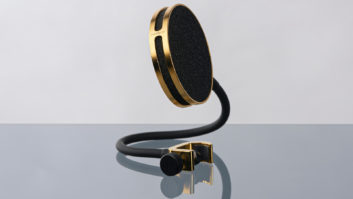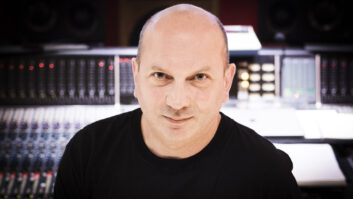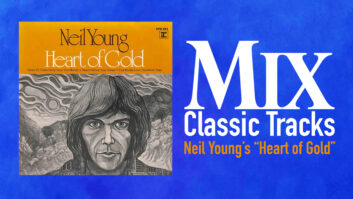Steven Gold jumped into the music business early on, singing jingle dates with his two brothers while still attending grade school in the Bronx. Then he worked early and hard to create a space for himself in the industry, apprenticing to several major Manhattan jingle companies during his high school years. “I would throw out the trash and straighten things up at EasyWriter Music and Mega Music, all the while watching the way musical arrangements were developed,” he says. “I also saw what it took to develop positive relationships with clients in a high-pressured business. I took piano lessons when I was a kid, and so I had some keyboard chops. Eventually, I was given the opportunity to work on some arrangements.”
After graduating from high school, Gold tried following a conventional path, but after half a year at NYU he bagged academia and hit the streets looking for music gigs on his own. It takes chutzpah for a teenager to set up his own jingle company, but that’s exactly what Gold did: “I started out by calling on production companies,” he says. “The only way I was going to get a shot and put a reel together was to offer original music at stock prices, and by doing the work up front, for no charge. That way, if a client didn’t like the music I came up with, they didn’t have to pay anything. If they did like it, all they paid was the same minimal charge they’d pay for stock.”
Things started to click for Gold and Compositions, the name he gave his company. Operating out of his loft residence in lower Manhattan, Gold began to develop clients through major ad agencies, including Young & Rubicam, McCann Erickson, and BBD&O. “I broke into the ad agencies after working for some of the major infomercial production companies here in New York,” he says. “The only piece of equipment I owned was a Korg T3 workstation. I used it to do all my sequencing! When a client signed off on a demo, I’d take the T3 over to A&R or another legitimate studio, stripe SMPTE onto a multitrack, and dump the synth parts to tape one at a time and mix.”
The energy in his tracks clearly made up for the limited tools that Gold was using, and as his client list grew, Gold began to acquire more gear. “The first sampler I owned was a Casio; I forget the model,” he says. “I bought a Tascam M3500 console, which was very noisy but really looked like a board and had nice faders! As budgets grew, I added more synth modules and also started to add some live players into the mix. Eventually I built a studio on Park Avenue South, which is where I’ve been working until just recently.”
Gold and Compositions has expanded in two significant ways over the last several months, opening a Los Angeles office and merging its East Coast operation with an existing commercial studio on Greene Street. Gold also has a writing partner, Fountains of Wayne co-founder Adam Schlesinger, composer of the Academy Award-nominated song, “That Thing You Do.” “Adam and I have been writing TV music together for several years,” Gold says. “We wrote music for The Dana Carvey Show, and when that show’s producer, Robert Smigel, wrote the sketch called ‘The Ambiguously Gay Duo,’ we composed and sang the comedic song that accompanied it. After Dana’s show folded we moved over to Saturday Night Live to continue working on this ongoing cartoon skit and some other material.
“Writing comedic music takes a sensibility of its own, and from an engineering perspective there are some interesting tips we’ve picked up along the way,” he explains. “For example, after we recorded ‘The Ambiguously Gay Duo’ theme song, we put the two-mix through an Eventide S3000SE. Using a tremelo patch with a slow pitch modulation, we replicated the ‘wow and flutter’ sound to help capture the feel of the old recordings we were alluding to. We used Pro Tools on the last cartoon we did for SNL, and they have a retro plug-in that adds tape-like crackle and warble, which we used as well.
“Artistically, writing comedy music is a delicate business,” he continues. “Sometimes, a piece of music is funny simply because it’s the perfect cliche done well. Other times, writing a piece of music that isn’t funny at all, but has funny lyrics, can make a hilarious effect. Dorky music can be funny, too! When you parody styles, you have to nail the genre, that’s for sure.”
Gold is now concentrating on TV theme music, and so opening an L.A. office was a logical move. “Our TV credits include the opening of The Howard Stern Show on E! Entertainment Television, and that was a fun assignment,” he says. “Howard was looking for something raw and nasty, but contemporary. Adam and I thought of Prodigy, Nine Inch Nails and Chemical Brothers, with a little TV ‘sheen’ added in. After sending Howard a few demos, he and producer Jim Biederman chose the one we all agreed was the best for the visuals they were developing.
“Out in L.A. we have a Yamaha 02R, and I have to say that doing the E! project for the Stern show would have been next to impossible without it, because there were a ton of variations to the main theme. They wanted us to develop a variety of bumpers and teasers of various lengths to go with the graphics library they were developing. Being able to save and recall board settings on the 02R was a big help.” Other recent TV credits include music for Comedy Central’s The Man Show and ABC’s David Blaine: Magicman.
Logging too many hours on commercial jets, Gold currently splits his time evenly between L.A. and New York, writing music and expanding his business with very little outside business assistance. “Things have flowed naturally, with very little hustling, which is nice,” he comments. “I realized that I needed a legitimate studio to operate out here on the East Coast, and that’s why I partnered with David Gervai. He’s operated a commercial facility for 12 years. I’m not a gear-head or technical expert, and so I needed to hook up with someone who was well-versed in those areas, and David fits the bill perfectly.”
When we spoke, final touches were being put on the renovations to Gervai’s existing space. “The room centers around a Mackie Digital 8 Bus console, which I like a lot,” Gold says. “The main reason I wanted to move in was that the live room has a real nice sound. David gets a great drum sound, and we’ll be able to record small ensembles as well. My previous space was a glorified writing room; here we’ve got a ton of amps and the ability to get a killer band sound, which is really important to me at this point.”
Since his early days sweeping up at jingle houses, Gold has studied the growth cycle of music production companies. Staying small can put a lot of pressure on a writer, who often has to assume management responsibilities that he or she may not be naturally inclined toward, and assignments don’t always come in an organized, sequential fashion. However, there’s also a danger in growing too large by adding other writers-the energy that characterized the individual can get diluted into a generic sound. “Will I create a company that relies on other composers?” Gold asks. “I won’t be going the route of some of the major jingle companies, that’s for sure. Right now I’m comfortable having Adam as a partner. The work is coming in steadily, and we’re having a lot of fun.”

